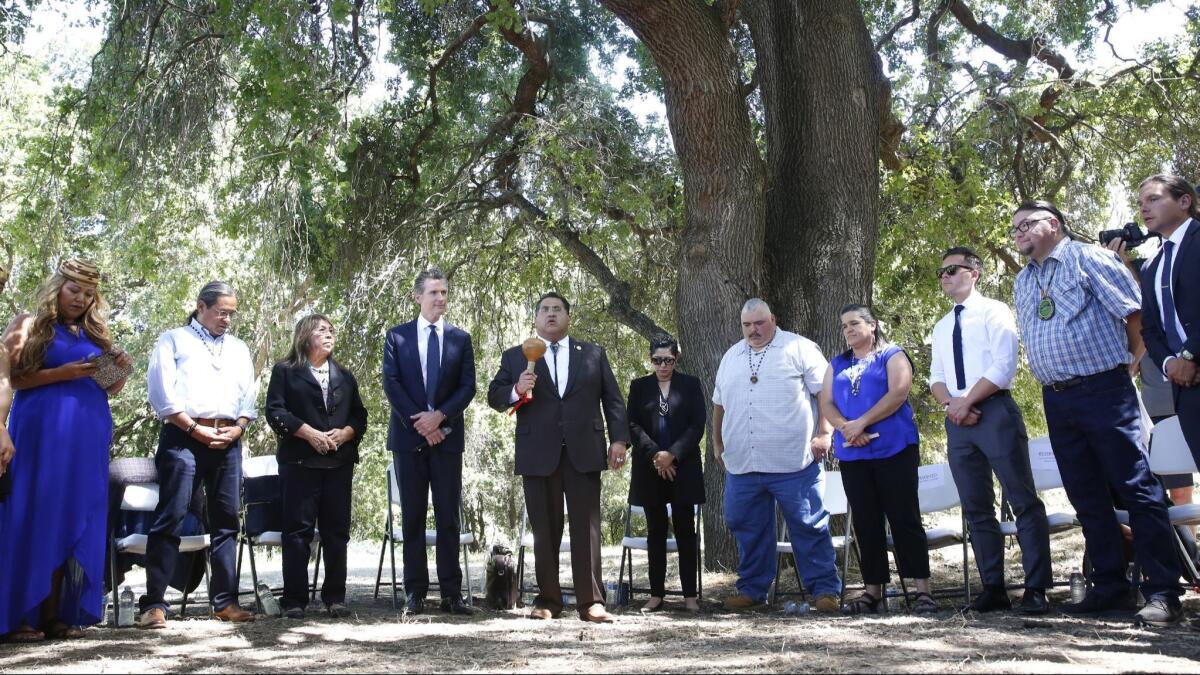Newsom apologizes for California’s history of violence against Native Americans

- Share via
Reporting from Sacramento — Gov. Gavin Newsom issued an executive order Tuesday apologizing on behalf of the citizens of California for a history of “violence, maltreatment and neglect” against Native Americans in a rare move that some tribal leaders said could begin a healing process for their communities.
“California must reckon with our dark history,” Newsom said. “We can never undo the wrongs inflicted on the peoples who have lived on this land that we now call California since time immemorial, but we can work together to build bridges, tell the truth about our past and begin to heal deep wounds.”
Newsom offered an in-person apology during remarks at a blessing ceremony at the site of the future California Indian Heritage Center in West Sacramento. Former Gov. Jerry Brown approved $100 million last year to build the center near the fork of the Sacramento and American rivers.
Newsom said he had discussed a formal apology with advisors for several months and decided to take action Tuesday when more than 100 tribal leaders from all over the state visited Sacramento for an annual meeting.
“It’s called a genocide. That’s what it was. A genocide. [There’s] no other way to describe it and that’s the way it needs to be described in the history books,” Newsom said. “And so I’m here to say the following: I’m sorry on behalf of the state of California.”
The governor’s order references an 1851 address from the state’s first chief executive, Gov. Peter Burnett, in which he tells lawmakers to expect “a war of extermination” to continue “until the Indian race becomes extinct.”
A year earlier in the Legislature’s first session, lawmakers approved an “Act for the Government and Protection of the Indians” that allowed Native Americans to be sold into indentured servitude for minor offenses and separated children from their families. The state spent the equivalent of more than $1 million in currency at the time to subsidize militia campaigns against the native people, according to the governor’s office.
California’s American Indian population declined from about 150,000 to 30,000 between 1846 and 1879, wrote Benjamin Madley, an assistant professor of history at UCLA, in a 2016 op-ed calling for the state to acknowledge the genocide. Madley is the author of the 2009 book, “An American Genocide: The United States and the California Indian Catastrophe, 1846-1873.”
Daniel Salgado, chairman of the Cahuilla Band of Indians, said Newsom’s formal apology is a recognition of a long history of atrocities against native people in California.
“People can say it should have come a long time ago but I appreciate that this governor is stepping up and taking that first step in what we believe is a healing process,” Salgado said. “In any kind of relationship, there’s recognition of a wrongdoing, an apology and a healing starts to take place.”
Newsom’s office said the state has never formally apologized for actions against Native Americans.
The governor is also calling for a Truth and Healing Council to hear testimony and clarify the historical record on the relationship between the state and California Native Americans. Christina Snider, Newsom’s tribal advisor and a member of the Dry Creek Rancheria Band of Pomo Indians, will lead the council and delegates from the state’s tribes will work with her to issue a draft report on its findings by Jan. 1.
When asked whether the state should provide more formal reparations for California Native Americans, Newsom said he hadn’t engaged in those conversations and believed the council would provide a forum to discuss future steps.
Abby Abinanti, chief judge of the Yurok Tribal Court, said she hoped the council would serve as a model for other states.
“It’ll be a long process, an education process,” Abinanti said. “Truth is a good thing. Healing is a good thing. We’re at a time and place in the world where it’s essential for us to try to do those things.”
Sitting in a circle of plastic chairs under an oak tree with the governor Tuesday afternoon, tribal leaders shared stories of ancestral trauma at the hands of settlers during the solemn event in triple-digit heat.
Assemblyman James Ramos (D-Highland), the first California Indian elected to the state Legislature, sang a song about a hummingbird seeking nectar to symbolize the nourishment he said Newsom’s apology provided to tribal communities.
Several attendees expressed optimism that the governor would continue a meaningful dialogue with tribal communities and work collaboratively with them.
“It’s healing to hear your words, but actions will speak for themselves,” said Erica Pinto, chairwoman of the Jamul Indian Village. “I do look forward to hearing and seeing more of you.”
More stories from Taryn Luna »
Follow @tarynluna on Twitter.
More to Read
Get the L.A. Times Politics newsletter
Deeply reported insights into legislation, politics and policy from Sacramento, Washington and beyond. In your inbox three times per week.
You may occasionally receive promotional content from the Los Angeles Times.











